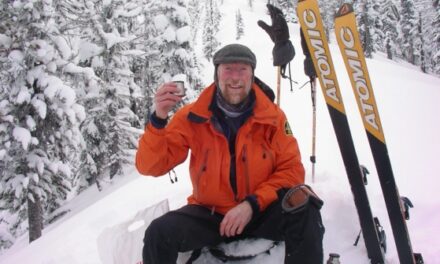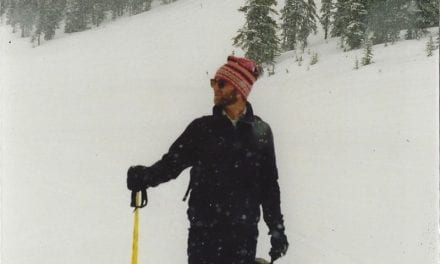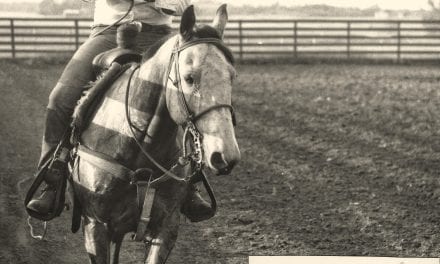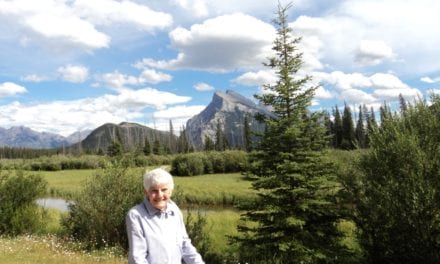Julie – I think too, we loved it because of the idealism that we had about what parks stands for and what they are preserving. We loved it even if at times it was very hard. I was just reading in my journal about once when we hiked back to the Brazeau alone. A warden friend and neighbour, Terry Gibbons sometimes would snowshoe the 95 miles to our place to help us travel the eighteen miles to the highway with our baby. On this occasion we were dropped off at Camp Parker and we snowshoed in to our cabin alone, Max carrying the baby and I with some needed supplies. I was so tired I wanted to just lie down in the snow and hibernate. There were things that were difficult and hard and even boring such as the food that you had to eat. But we loved it! We just loved getting up every morning and the work that we did at that time. There was time to get to know yourself, to be able to depend on yourself and to learn what you were capable of.
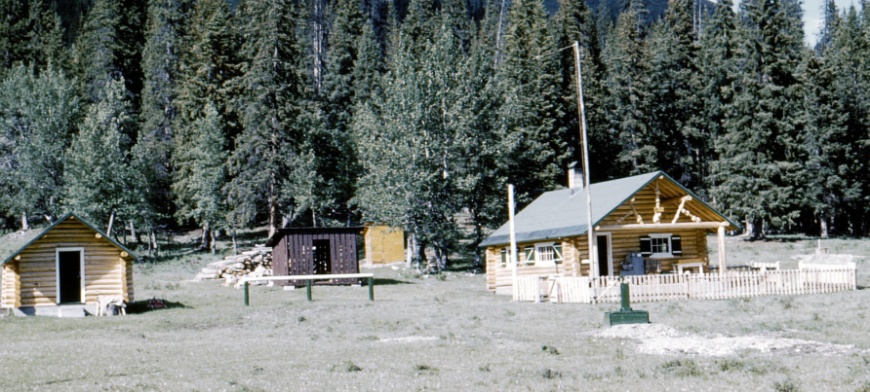
Brazeau
Max – It was easier for me because I was in top physical condition. I was a strong as a bear then. I snowshoed in the wintertime between 200 and 250 miles/month. I rode and walked between 400 and 500 miles/month in the summertime. I worked hard long hours but I enjoyed it.
Julie – I loved the challenge of the warden life. I loved the isolation of it. Yes I did, I corresponded with quite a few people and there was time to write letters. They graciously replied and it was a real thrill when the mail came in at the end of the month!
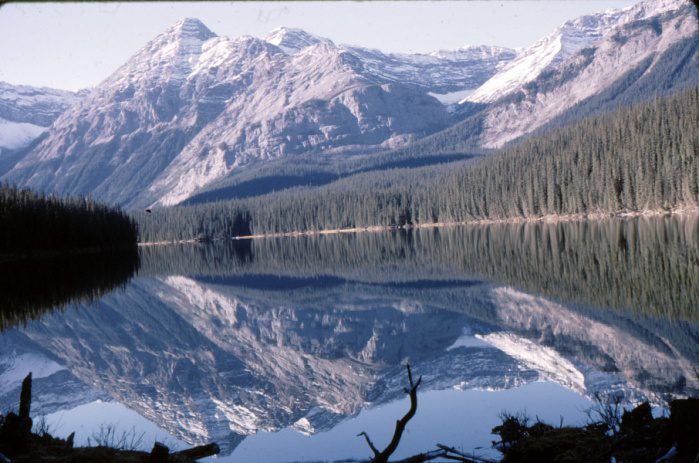
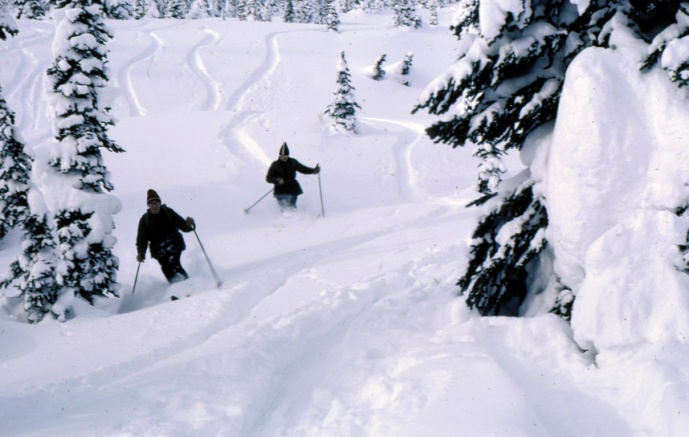
Jacques Lake and Mount Fidelity Glacier National Park
Max – We had daily diaries at the time and we were supposed to turn them in at month’s end. We were supposed to take Sundays off on the district and could save up Saturdays for the monthly trip to town. Quite often you would go to town and if you had two or three days, on the first day, you know, you were excited and you would go to the office and the chief warden would say, “Well, how was your trip? When did you get in? When are you going to go back out again?” That usually bothered us very much because we’d just arrived. If you showed up for two or three days they would say, “When are you going back out again?” You knew that you had to head back out again. In the summer nobody, at least not to my knowledge, spent very much time in town. You got your groceries; you did what you had to do, sometimes you needed to make repairs for something or other and out you went again. But in the wintertime after you had travelled on snowshoes, like there was one place where I had to go 30 miles to get to the highway, you know, you felt like you needed a little bit of rest. You would do all your chores and then you went to a restaurant. Usually my friend and neighbour, Terry Gibbons and I would be in telephone contact. In the backcountry the only communication was through the forestry telephones. So we would arrange when we would be at the border of our districts which was at Cairn Pass. We would quite often arrange to be there at the same time. Then we would spend the night together. Sometimes we would do a bit of travelling together in some of the different places, go climb a mountain, something like that. And the same thing we would arrange when we were in town.There would be a few other guys like Mac Elder. He was at the opposite end of the park but he would also be in town at the month’s end. Sometimes we would have a meal together, go to the bar, and have a few beers. When we went to a restaurant, you know, we had a real craving for salads because you didn’t have very much of that. Also ice cream was another thing. People would sometimes look at us because we would be having a banana split and a big salad. In the summer it wasn’t much of a problem to take in fresh food but in the winter, say a chicken or pork chops would go in the pack. You hardly ever travelled with less than 60 pounds. Sometimes more than that!
Julie – It was partly the challenge of the isolation itself. How do you keep yourself occupied? Of course there was reading but often it was not very good reading, a poor choice of books. Max would sometimes bring in pocket books, things like that. We subscribed to several magazines. When I was on the district, as a sort of occupational therapy I began woodcarving. I don’t know if you would know this but in Macleans magazine there was a cartoon of Jasper the Bear. I wrote to the cartoonist, James Simpkins, sending him a carved figure of Jasper the Bear and asking his permission to carve and sell these. I have a thick book in which I’ve kept photos of my different carvings and in it is James Simpkins’ letter in which he gave his consent. So, I began taking these carvings to town to sell in a gift shop or Max would take them in his back pack or in a pack box when he rode in. There were figures of Jasper skiing, or with a rope and ice axe, of him doing various things like curling or golfing. They would sell like hot cakes. One time I walked into the gift shop with a carving in my hand, a woman saw me and followed me to the counter. She pointed to the carving and said to the clerk, “I want that. How much is it?” I was quietly asked my price. “$20.00, I said” and the clerk said to the lady, “That will be $39.95.” I had no trouble selling them but in hindsight I think my prices were too low. I was glad to be making a little cash. I have forgotten how many I carved but in reading my journal I noted that I had written, “I’m working on my 46th Jasper.”
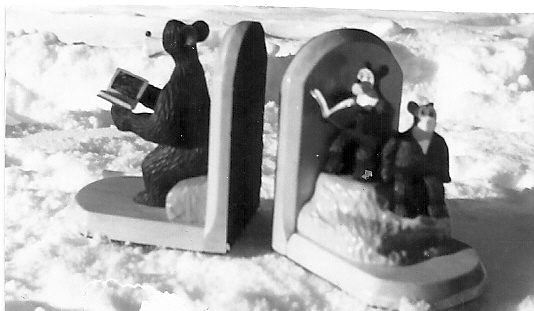
Max – Of course we have to say that at that time we bought nine months worth of winter groceries for $700.00
Julie – Mind you, That would be the staples of canned goods, flour, sugar, rice, pasta, raisins and so on.
Max – They gave the wardens 10 or 15% off in Clark’s or Robinson’s grocery store.
Julie – Cooking was a challenge. Of course I always had to make the bread. When Max would be planning a ten day trip to the far end of the district he had to pack the bread along or make it himself. I enjoyed baking but it wasn’t a modern stove with a thermostat. It was a wood stove with an enamel front. It took a while to get to know how to bake bread with it.
Max – Jasper was probably behind in stuff that was provided; like we had a horrible bed in one district that Julie said was sagging in all directions.
Julie – It was like a bathtub!
Max – She thought our knees would bend backwards. You tended to roll into the middle. It really was a thing of togetherness. Julie put a pole in between us under the mattress…
Julie – But then we each had our own little bathtub.
Max – It didn’t work too well so she put a wire under and I said, “She strung barbed wire in between us.”
Julie – Oh, it was uncomfortable! But we would store things underneath the bed (like bags of sugar and flour) and for a while the bed didn’t sag.
Max – Because we had all this food stored in the fall. So for a while, until we ate our way down, the bed was a little better. You could laugh about it or you could get really upset about the whole thing. But while we were there in the two districts they bought us a new bed and mattress. We just felt like kings. (Royalty, that is.)
Julie – No, with the baby I didn’t go into town with Max.
Max – That’s when he was small, in the first district. At Rocky River it wasn’t so much of a problem.
Julie – And we had a Skidoo there.
Max – But the first district, it was really an adventure. To travel to the highway was a minimum of a two day trip, one way, in winter and it could be a three day trip, depending on the weather.
Julie – Once I was there for five months without coming out and the longest time I was there was for seven months without going in to town or seeing another woman. The summer the cabin building crew was there I was there for seven months and in that time I saw only these eight people. I just accepted it and I made the most of it. Generally, we look back at this time as really a pivotal time in our lives. We’ll say now, “Well, it is really cold, but remember how cold it was on the Brazeau.” It was only for four years we were off the highway but they were four years that were such an important time in our lives because we learned so much about ourselves and about each other. I’m telling you, you live in a one room cabin and it will either make or break a marriage. We had been married four or five years at that time. And we just had our 54th anniversary!
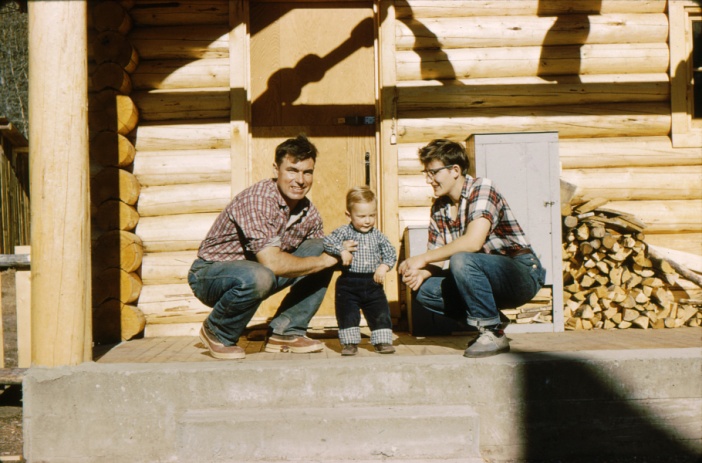
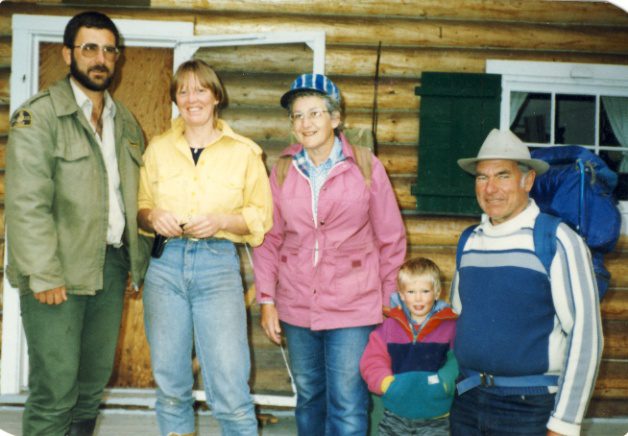
Brazeau 1961 & 1989
Max – And we haven’t killed each other! Sometimes we felt like it! This, I think, is because we both felt similar in various situations. You tackle certain things and you are willing to tackle them and you had the feeling that you could do it. Like making our furniture. It made our time better there, but you also had a certain pride, like building that 75 foot bridge together. Probably one or two other wardens might have done the same thing but not very many.
Julie – Just the mechanics of it…
Max – We built an abutment on both sides of the creek. I cut the trees in such a way that they fell reasonably close to the water. Then I cut them into lengths and Julie peeled them. You bring a pole or tree into the water and after a while it has a tendency to move with the current. So I had to be in the water to lift it up onto the abutment on the other side while Julie was moving it forward with block and tackle. That was for the first one. The second one we kind of had it lying diagonally across the first one and that wasn’t bad because then you had a means to move it to the other side. We had to move at least five long poles that way and then place the decking on it. The 3” planks had been sawn at the park sawmill and I brought them in by Skidoo. And 20 years later, when we were in Waterton, we went up there and the bridge was still there and in use.
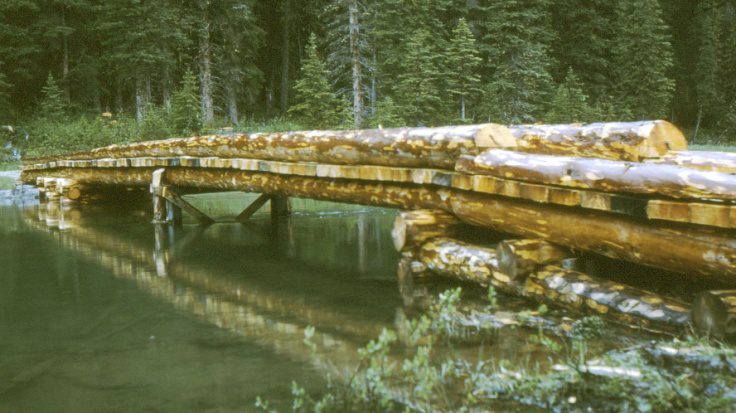
Julie – Building things was fun; if you needed a vegetable grater you just cut and flattened a tin can, pounded nail holes in it, turn it over and there you have a grater. You just had to invent things.
Max – You couldn’t go to the store…you had to make do with what you had. One of the things that we enjoyed was that most of the districts had at least a hammer, a saw, a plane and various other tools and we made use of them.
Julie – At Jacques Lake there was wonderful fishing. One time fishing I had five Dolly Varden trout and when I stepped on the scale while holding they I had gained 25 pounds! Some were bigger than others so there were some weighing more than 5 pounds. Then I had to figure how to keep that much fresh fish. So I made a smoker. There was a little fire pit with a five foot stove pipe running underground up a little slope to let the smoke rise into a barrel, with a sack over it to keep the smoke in. Inside was a rack to hold the filleted fish. First the fish were left in a brine of water , salt and brown sugar for quite a few hours, then dried and left to smoke for a about the same length of time. They kept pretty well and were delicious. Things like that we were always figuring out. We got such a kick out of it. When we got the “ranch” we did things like that. We are still doing things like that. That’s, I think, why we look back at that time so fondly. You found that you could improvise.
